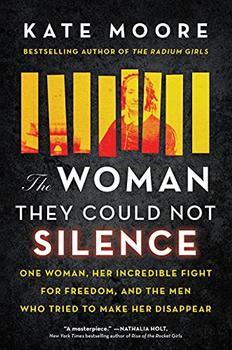Summary | Excerpt | Reading Guide | Reviews | Beyond the Book | Readalikes | Genres & Themes | Author Bio

One Woman, Her Incredible Fight for Freedom, and the Men Who Tried to Make Her Disappear
by Kate Moore
Theophilus's response was telling. He did not allow his wife agency. He did not encourage her growth. Instead, he wrote that he had "sad reason to fear his wife's mind was getting out of order; she was becoming insane on the subject of woman's rights."
On the morning of June 18, 1860, Elizabeth shifted uncomfortably in bed, her disquiet slowly intensifying. Beyond her bedroom window, the noise of the nearby prairie filtered through the closed green shutters. Elizabeth loved living in the Midwest. "Action is the vital element out here," she wrote approvingly. "The prairie winds are always moving—no such thing as a dead calm day here."
By this point, that lack of calmness applied to the Packards' marriage too, because their differences had only increased after the family moved west five years earlier. The change of scene had reflected Elizabeth's literally widening horizons. Shelburne, Massachusetts, where the Packards had lived for most of their marriage, was a place dominated by mountains and trees: a landscape that spoke deafeningly of what had always been and always would be. In contrast, the open prairies and wide skies of the Midwest seemed to herald endless possibilities—what could be, not what had been. Elizabeth felt strongly that "woman's mind ain't a barren soil," and once she was living in the fertile Midwest, she'd gotten busy planting seeds. "No man shall ever rule me," she declared, "for I ain't a brute, made without reason... I'm a human being, made with reason...to rule myself with."
She put that reason into practice. Soon, it wasn't just her appetite for women's rights that disturbed Theophilus. Elizabeth had a fiercely inquiring mind, and once she began to pull at the threads of their misogynistic society, the whole tapestry of their lives started to unravel. Both Packards were extremely devout, yet Elizabeth became wary of mindlessly swallowing what other people preached, including the sermons of her husband. Instead, she read widely about other faiths and philosophies until eventually her independent thinking led her to question her husband's creed.
In fact, almost by nature, Elizabeth and Theophilus worshipped different gods. To Elizabeth, God was love. But to Theophilus, He was a distant tyrant who dispensed His mercy so sparingly and secretly that one never quite knew if one had done enough to be saved. Where Elizabeth saw good in all, Theophilus believed every-one was damned unless they found his God—and that included himself. The pastor, fearful God would find out the least sin in his naturally dark heart, "used to tell God what an awful bad man he was, in his family prayers." Elizabeth commented wryly, "I was almost ashamed to think I had married such a devil, when I had so fondly hoped I had married a man."
Theophilus's beliefs extended to his children, too. He felt their hearts were "wrong by nature, and must be changed by grace." For their own good, he told them so, bluntly describing the hellish fate that awaited them until the children cried. Her heart hurting, Elizabeth would comfort them. She'd counsel, in opposition to Theophilus's teachings, "Be your own judge of your own nature...don't be deluded into the lie that you are bad."
Her "irreligious influence" caused Theophilus "unspeakable grief." He professed himself worried for his children's souls. When, each Sabbath, Elizabeth and the children would gather in her kitchen for "good talking times" after church, Theophilus could not contain his disapproval. He'd grumble as he retired alone to his study that they were "Laughing! On the brink of hell!"
Elizabeth was not laughing now.
Excerpted from The Woman They Could Not Silence by Kate Moore. Copyright © 2021 by Kate Moore. Excerpted by permission of Sourcebooks. All rights reserved. No part of this excerpt may be reproduced or reprinted without permission in writing from the publisher.
Your guide toexceptional books
BookBrowse seeks out and recommends the best in contemporary fiction and nonfiction—books that not only engage and entertain but also deepen our understanding of ourselves and the world around us.